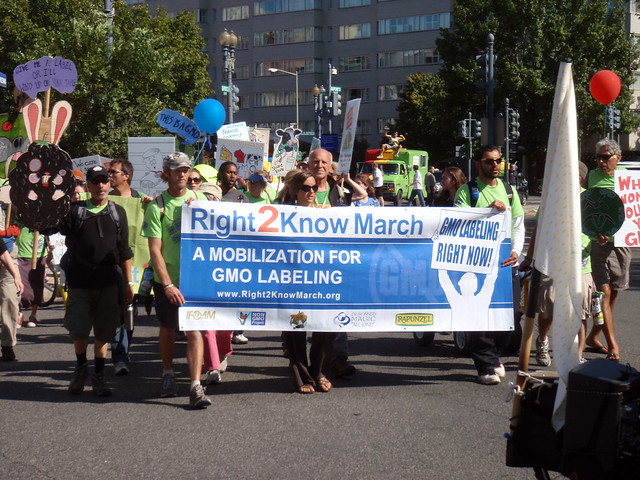August 2013
 |
| Right2Know March in the US. Photo by Daniel Lobo on Flickr |
Way back in the pre-dawn of the GM era,
the President of Asgrow Seed Co, a subsidiary of Monsanto, said:
“If you put a label on genetically engineered food you might as well put a skull and crossbones on it” (Kansas City Star, 7.03.94).
At about the same time, UK regulators
found themselves grappling with the novel foods expected to flood our
food chain. The food safety advisory body dreamed up the idea that
all that was necessary was to educate the people about GM and they
would be happy to accept it.
When the British public failed to
believe that 'scientists know what they are doing', the 'GM
Nation?' debate was organised,
including a 'narrow-but-deep' discussion panel expected to show how
we would become more accepting of GM once we learned more about it.
Our government was wrong: the more people know about GM food, the
less they trust it.
In the event, the
EU gave us mandatory GM-information labelling, albeit in small-print,
and this, indeed, turned out to be as powerful as a skull and
crossbones.
Americans have not been so fortunate.
National GM labelling laws have never existed, GM labelling
initiatives at State level have repeatedly failed, and a couple of
State laws passed recently are so limited and proviso-ridden that
they don't actually amount to any labelling. But despite all this,
there's been a sudden scramble among US food-suppliers to source
non-GM supplies.
The reason, as the Canola Council of
Canada's annual convention were told, is that GM labelling is no
longer just an idle threat. In fact, anyone who thinks GM is not
going to be an issue is “smoking dope” (President of Sloan Trends
Inc.).
These warnings came after nearly 90% of
'healthy' food retailers showcasing their latest products at the
Natural Products Expo West trade show in California had 'GMO-free' on
the label. Even Walmart has realised the tide is turning and has
announced it is no longer going to oppose GM labelling.
The threat of GM labelling is driving
change at all levels of the US food chain.
Leading supermarket chain, Whole Food
Market, is demanding that all lines in its US and Canadian stores
must be labelled by 2018. Its suppliers are busy re-formulating
their products and trying to source non-GM ingredients.
Plenty of other food companies are
taking similar steps.
Applications to the 'Non-GMO Project'
for GM-free certification have risen exponentially.
A newly constructed canola oil
processing plant in Washington State is taking as much non-GM seed as
it can find.
Besides this new market force, US
farmers have a clear financial incentive to switch to growing non-GM:
conventional soya's premium has jumped from $1 to $2 above GM, and
conventional maize's premium has jumped from 10 cents to 75 cents.
The livestock industry is increasing
its demand for non-GM feed to meet consumer demands for meat and eggs
from animals not raised on GM feed.
OUR COMMENT
Meanwhile, the UK government is pushing our agriculture down a lonely GM-based pathway which may not lead to any market anywhere in the world (see WESTMINSTER ROLLING OUT THE RED CARPET FOR GM - July 2013).
Consider drawing the government's attention to what's happening on the other side of the pond, before it ploughs any more of your taxes into dead-end GM science and technology.
SOURCES:
- Ronnie Cummins, Monsanto Nation: Taking Down Goliath, Organic Consumers Association, 27.07.11
- Sean Prat, Non-GM canola oil demand has crusher scrambling, Western Producer, 24.05.13
- Stephanie Strom, Seeking Food Ingredients That Aren't Gene-Altered, New York Times, 26.05.13
No comments:
Post a Comment
Thanks for your comment. All comments are moderated before they are published.